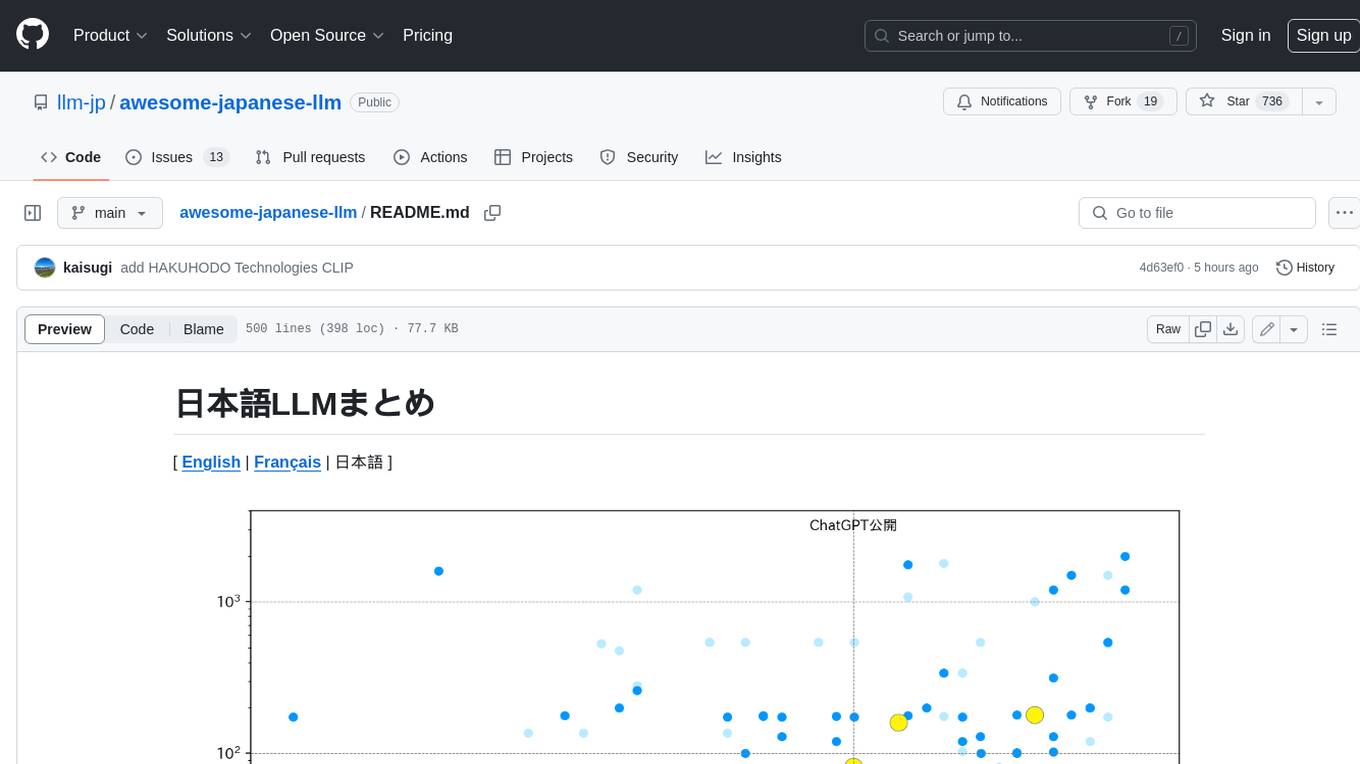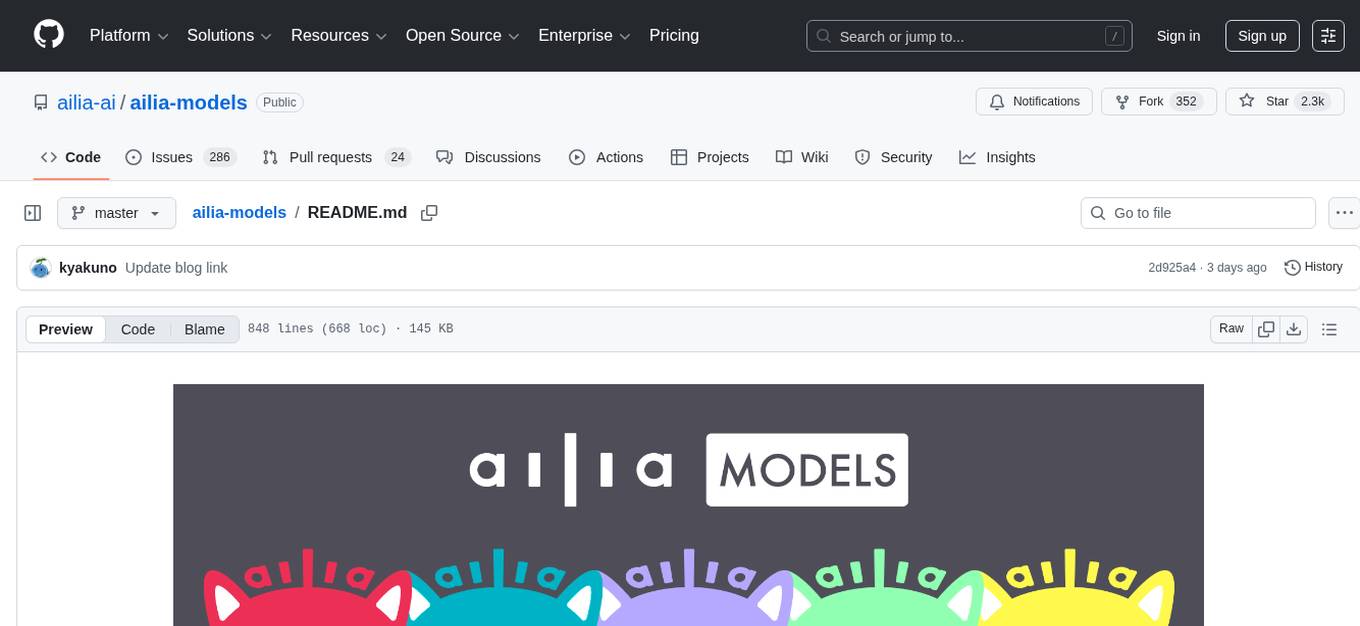
Conference-Acceptance-Rate
Acceptance rates for the major AI conferences
Stars: 4015
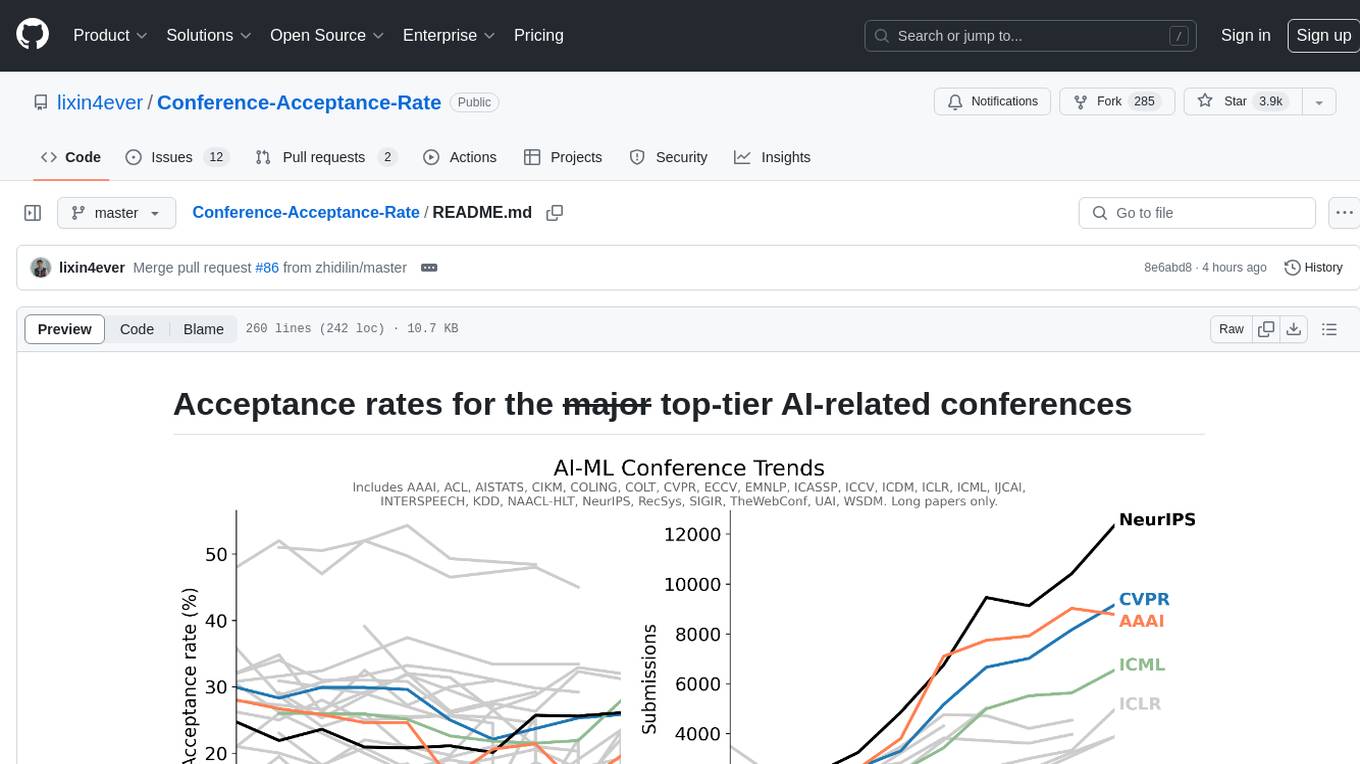
The 'Conference-Acceptance-Rate' repository provides acceptance rates for top-tier AI-related conferences in the fields of Natural Language Processing, Computational Linguistics, Computer Vision, Pattern Recognition, Machine Learning, Learning Theory, Artificial Intelligence, Data Mining, Information Retrieval, Speech Processing, and Signal Processing. The data includes acceptance rates for long papers and short papers over several years for each conference, allowing researchers to track trends and make informed decisions about where to submit their work.
README:
| Conference | Long Paper | Short Paper |
|---|---|---|
| ACL'14 | 26.2% (146/572) | 26.1% (139/551) |
| ACL'15 | 25.0% (173/692) | 22.4% (145/648) |
| ACL'16 | 28.0% (231/825) | 21.0% (97/463) |
| ACL'17 | 25.0% (195/751) | 18.9% (107/567) |
| ACL'18 | 25.3% (258/1018) | 24.0% (126/526) |
| ACL'19 | 25.7% (447/1737) | 18.2% (213/1168) |
| ACL'20 | 25.4% (571/2244) | 17.6% (208/1185) |
| ACL'21 | 24.5% (571/2327) | 13.6% (139/1023) |
| ACL'21 Findings | 14.6% (339/2327) | 11.5% (118/1023) |
| ACL'22 | ? (604/?) | ? (97/?) |
| ACL'22 Findings | ? (361/?) | ? (361/?) |
| ACL'23 | 23.5% (910/3872) | 16.5% (164/992) |
| ACL'23 Findings | 18.4% (712/3872) | 19.1% (189/992) |
| EMNLP'14 | 30.4% (155/510) | 27.8% (70/252) |
| EMNLP'15 | 26.2% (157/600) | 22.1% (155/700) |
| EMNLP'16 | 25.8% (177/687) | 21.8% (87/400) |
| EMNLP'17 | 25.8% (216/836) | 18.4% (107/582) |
| EMNLP'18 | 25.5% (351/1376) | 23.2% (198/855) |
| EMNLP'19 | 25.6% (465/1813) | 20.5% (218/1063) |
| EMNLP'20 | 24.5% (602/2455) | 16.6% (150/904) |
| EMNLP'20 Findings | 13.5% (332/2455) | 12.7% (115/904) |
| EMNLP'21 | 25.6% (650/2540) | 17.9% (190/1060) |
| EMNLP'21 Findings | 11.8% (300/2540) | 11.2% (119/1060) |
| EMNLP'22 | 22.1% (715/3242) | 12.0% (114/948) |
| EMNLP'22 Findings | 14.0% (453/3242) | 10.1% (96/948) |
| EMNLP'23 | 23.3% (901/3868) | 14.0% (146/1041) |
| EMNLP'23 Findings | 22.9% (886/3868) | 19.5% (203/1041) |
| NAACL-HLT'13 | 30.0% (88/293) | 32.1% (51/162) |
| NAACL-HLT'15 | 29.1% (117/402) | 22.1% (69/312) |
| NAACL-HLT'16 | 25.3% (100/396) | 28.9% (82/284) |
| NAACL-HLT'18 | 32.0% (207/647) | 29.4% (125/425) |
| NAACL-HLT'19 | 26.3% (281/1067) | 21.3% (142/666) |
| NAACL-HLT'21 | 29.2% (366/1254) | 22.6% (123/544) |
| NAACL-HLT'22 | ? (358/?) | ? (84/?) |
| NAACL-HLT'22 Findings | ? (183/?) | ? (26/?) |
| COLING'12 | 27% (311/1000+) | - |
| COLING'14 | 30.8% (217/705) | - |
| COLING'16 | 32.4% (337/1039) | - |
| COLING'18 | 37.4% (332/888) | - |
| COLING'20 | 33.4% (622/1862) | - |
| COLING'22 | 33.4% (522/1563) | 24.2% (112/463) |
| Conference | Long Paper | Short Paper |
|---|---|---|
| CVPR'14 | 29.9% (540/1807) (104 orals and 436 posters) | - |
| CVPR'15 | 28.3% (602/2123) (71 orals and 531 posters) | - |
| CVPR'16 | 29.9% (643/2145) (83 orals, 123 spotlights and 437 posters) | - |
| CVPR'17 | 29.9% (783/2620) (71 orals, 144 spotlights and 568 posters) | - |
| CVPR'18 | 29.6% (979/3303) (70 orals, 224 spotlights and 685 posters) | - |
| CVPR'19 | 25.0% (1294/5160) (288 short orals and 1294 posters) | - |
| CVPR'20 | 22.1% (1470/6656) | - |
| CVPR'21 | 23.7% (1661/7015) (295 orals and 1366 posters) | - |
| CVPR'22 | 25.3% (2067/8161) | - |
| CVPR'23 | 25.8% (2360/9155) | - |
| CVPR'24 | 23.6% (2719/11532) (90 orals, 324 Highlight, 2305 posters) | - |
| ICCV'13 | 27.9% (454/1629) (41 orals and 413 posters) | - |
| ICCV'15 | 30.9% (525/1698) | - |
| ICCV'17 | 29.0% (621/2143) (45 orals, 56 spotlights and 520 posters) | - |
| ICCV'19 | 25.0% (1077/4304) (187 short orals and 1077 posters) | - |
| ECCV'14 | 27.9% (363/1444) (38 orals and 325 posters) | - |
| ECCV'16 | 26.6% (415/1561) (28 orals, 45 spotlights and 342 posters) | - |
| ECCV'18 | 31.8% (776/2439) (59 orals and 717 posters) | - |
| ECCV'20 | 27.1% (1361/5025) (104 orals, 161 spotlights and 1096 posters) | - |
| Conference | Long Paper | Short Paper |
|---|---|---|
| ICML'14 | 15.0% (Cycle I), 22.0% (Cycle II) | - |
| ICML'15 | 26.0% (270/1037) | - |
| ICML'16 | 24.0% (322/?) | - |
| ICML'17 | 25.9% (434/1676) | - |
| ICML'18 | 25.1% (621/2473) | - |
| ICML'19 | 22.6% (773/3424) | - |
| ICML'20 | 21.8% (1088/4990) | - |
| ICML'21 | 21.5% (1184/5513) (166 long talks, 1018 short talks) | - |
| ICML'22 | 21.9% (1235/5630) (118 long talks, 1117 short talks) | - |
| ICML'23 | 27.9% (1827/6538) (158 live orals, 1669 virtual orals with posters) | - |
| ICML'24 | 27.5% (2610/9473) (144 orals, 191 spotlights and 2275 posters) | - |
| NeurIPS'14 | 24.7% (414/1678) | - |
| NeurIPS'15 | 21.9% (403/1838) | - |
| NeurIPS'16 | 23.6% (569/2403) | - |
| NeurIPS'17 | 20.9% (678/3240) (40 orals, 112 spotlights and 526 posters) | - |
| NeurIPS'18 | 20.8% (1011/4856) (30 orals, 168 spotlights and 813 posters) | - |
| NeurIPS'19 | 21.1% (1428/6743) (36 orals, 164 spotlights and 1228 posters) | - |
| NeurIPS'20 | 20.1% (1900/9454) (105 orals, 280 spotlights and 1515 posters) | - |
| NeurIPS'21 | 25.7% (2344/9122) (55 orals, 260 spotlights and 2029 posters) | - |
| NeurIPS'22 | 25.6% (?/10411) (? orals, ? spotlights and ? posters) | - |
| NeurIPS'23 | 26.1% (3218/12343) (67 orals, 378 spotlights and 2773 posters) | - |
| ICLR'14 | - | - |
| ICLR'15 | - | - |
| ICLR'16 | - | - |
| ICLR'17 | 39.1% (198/507) (15 orals and 183 posters) | - |
| ICLR'18 | 32.0% (314/981) (23 orals and 291 posters) | - |
| ICLR'19 | 31.4% (500/1591) (24 orals and 476 posters) | - |
| ICLR'20 | 26.5% (687/2594) (48 orals, 107 spotlights and 532 posters) | - |
| ICLR'21 | 28.7% (860/2997) (53 orals, 114 spotlights and 693 posters) | - |
| ICLR'22 | 32.9% (1095/3328) (54 orals, 176 spotlights and 865 posters) | - |
| ICLR'23 | 32.0% (1574/4956) (91 orals, 280 spotlights and 1203 posters) | - |
| ICLR'24 | 30.81% (2250/7304) (85 orals, 366 spotlights and 1799 posters) | - |
| COLT'14 | 32.1% (45/140) | - |
| COLT'15 | 34.8% (62/178) | - |
| COLT'16 | 26.1% (53/203) | - |
| COLT'17 | 32.5% (74/228) | - |
| COLT'18 | 27.2% (91/335) | - |
| COLT'19 | 30.0% (118/393) | - |
| COLT'20 | 30.9% (120/388) | - |
| UAI'14 | 32.0% (94/292) | - |
| UAI'15 | 34.0% (99/291) | - |
| UAI'16 | 31.0% (85/275) | - |
| UAI'17 | 31.0% (87/282) | - |
| UAI'18 | 30.8% (104/337) | - |
| UAI'19 | 26.0% (118/450) | - |
| UAI'20 | 27.5% (142/515) | - |
| UAI'21 | 26.3% (205/777) | - |
| UAI'22 | 32.3% (230/712) (36 orals and 194 posters) | - |
| UAI'23 | 31.2% (243/778) | - |
| AISTATS'14 | 35.8% (120/335) | - |
| AISTATS'15 | 28.7% (127/442) | - |
| AISTATS'16 | 30.7% (165/537) | - |
| AISTATS'17 | 31.7% (168/530) | - |
| AISTATS'18 | 33.2% (214/645) | - |
| AISTATS'19 | 32.4% (360/1111) | - |
| AISTATS'20 | - | - |
| AISTATS'21 | 29.8% (455/1527) (48 orals) | - |
| AISTATS'22 | 29.2% (493/1685) | - |
| AISTATS'23 | 29.4% (496/1686) | - |
| AISTATS'24 | 27.6% (546/1980) | - |
| Conference | Long Paper | Short Paper |
|---|---|---|
| AAAI'14 | 28.0% (398/1406) | - |
| AAAI'15 | 26.7% (531/1991) | - |
| AAAI'16 | 25.8% (549/2132) | - |
| AAAI'17 | 24.6% (638/2590) | - |
| AAAI'18 | 24.6% (933/3800) | - |
| AAAI'19 | 16.2% (1150/7095) | - |
| AAAI'20 | 20.6% (1591/7737) | - |
| AAAI'21 | 21.4% (1692/7911) | - |
| AAAI'22 | 15.0% (1349/9020) | - |
| AAAI'23 | 19.6% (1721/8777) | - |
| AAAI'24 | 23.75% (2342/9862) | - |
| IJCAI'13 | 28.0% (413/1473) | - |
| IJCAI'15 | 28.6% (572/1996) | - |
| IJCAI'16 | 24.0% (551/2294) | - |
| IJCAI'17 | 26.0% (660/2540) | - |
| IJCAI'18 | 20.5% (710/3470) | - |
| IJCAI'19 | 17.9% (850/4752) | - |
| IJCAI'20 | 12.6% (592/4717) | - |
| IJCAI'21 | 13.9% (587/4204) | - |
| IJCAI'22 | 14.9% (679/4535) | - |
| Conference | Long Paper | Short Paper |
|---|---|---|
| KDD'14 | 14.6% (151/1036) | - |
| KDD'15 | 19.5% (160/819) | - |
| KDD'16 | 13.7% (142/1115) | - |
| KDD'17 | 17.4% (130/748) | - |
| KDD'18 | 18.4% (181/983) (107 orals and 74 posters) | - |
| KDD'19 | 14.2% (170/1200) (110 orals and 60 posters) | - |
| KDD'20 | 16.9% (216/1279) | - |
| KDD'22 | 15.0% (254/1695) | - |
| KDD'23 | 22.1% (313/1416) | - |
| SIGIR'14 | 21.0% (82/387) | 40.0% (104/263) |
| SIGIR'15 | 20.0% (70/351) | 31.3% (79/252) |
| SIGIR'16 | 18.0% (62/341) | 30.6% (104/339) |
| SIGIR'17 | 22.0% (78/362) | 30.0% (121/398) |
| SIGIR'18 | 21.0% (86/409) | 30.0% (98/327) |
| SIGIR'19 | 19.7% (84/426) | 24.4% (108/443) |
| SIGIR'20 | 26.5% (147/555) | 30.2% (153/507) |
| SIGIR'21 | 21.0% (151/720) | 27.6% (145/526) |
| SIGIR'22 | 20.3% (161/794) | 24.7% (165/667) |
| TheWebConf'14 | 13.0% (84/645) | - |
| TheWebConf'15 | 14.0% (131/929) | - |
| TheWebConf'16 | 16.0% (115/727) | - |
| TheWebConf'17 | 17.0% (164/966) | - |
| TheWebConf'18 | 15.0% (171/1140) | - |
| TheWebConf'19 | 18.0% (225/1247) | 19.9% (72/361) |
| TheWebConf'20 | 19.2% (217/1129) | 24.7% (98/397) |
| TheWebConf'21 | 20.6% (357/1736) | - |
| TheWebConf'22 | 17.7% (323/1822) | - |
| TheWebConf'23 | 19.2% (365/1900) | - |
| WSDM'14 | 18.0% (64/355) | - |
| WSDM'15 | 16.4% (39/238) | - |
| WSDM'16 | 18.2% (67/368) | - |
| WSDM'17 | 15.8% (80/505) | - |
| WSDM'18 | 16.1% (84/514) | - |
| WSDM'19 | 16.4% (84/511) | - |
| WSDM'20 | 14.8% (91/615) | - |
| WSDM'21 | 18.6% (112/603) | - |
| WSDM'22 | 15.8% (80/505) | - |
| WSDM'23 | 17.8% (123/690) | - |
| CIKM'14 | 21.0% (175/838) | 21.9% (57/260) |
| CIKM'15 | 26.0% (165/646) | 25.0% (69/276) |
| CIKM'16 | 23.0% (160/701) | 23.5% (55/234) |
| CIKM'17 | 20.0% (171/855) | 28.4% (119/419) |
| CIKM'18 | 17.0% (147/862) | 23.2% (96/413) |
| CIKM'19 | 19.4% (200/1030) | 21.3% (100/470) |
| CIKM'20 | 21.0% (193/920) | 25.9% (103/397) |
| CIKM'21 | 21.7% (271/1251) | 28.3% (177/626) |
| CIKM'22 | ?% (272/?) | ?% (196/?) |
| ICDM'14 | 9.8% (71/727) | 9.8% (71/727) |
| ICDM'15 | 8.4% (68/807) | 9.7% (78/807) |
| ICDM'16 | 8.6% (78/904) | 11.0% (100/904) |
| ICDM'17 | 9.3% (72/778) | 10.7% (83/778) |
| ICDM'18 | 8.9% (84/948) | 11.1% (105/948) |
| ICDM'19 | 9.1% (95/1046) | 9.5% (99/1046) |
| ICDM'20 | 9.8% (91/930) | 9.9% (92/930) |
| ICDM'21 | 9.9% (98/990) | 10.1% (100/990) |
| RecSys'15 | 23.0% (35/152) | - |
| RecSys'16 | 18.2% (29/159) | - |
| RecSys'17 | 20.8% (26/125) | 16.4% (20/122) |
| RecSys'18 | 17.7% (32/181) | - |
| RecSys'19 | 19.0% (36/189) | - |
| RecSys'20 | 17.9% (39/218) | - |
| Conference | Long Paper | Short Paper |
|---|---|---|
| INTERSPEECH'14 | - | - |
| INTERSPEECH'15 | 51.0% (~743/1458) | - |
| INTERSPEECH'16 | 50.5% (779/1541) | - |
| INTERSPEECH'17 | 52.0% (799/1582) | - |
| INTERSPEECH'18 | 54.3% (749/1320) | - |
| INTERSPEECH'19 | 49.3% (914/1855) | - |
| INTERSPEECH'20 | ~47% (?/?) | - |
| INTERSPEECH'21 | 48.4% (963/1990) | - |
| ICASSP'14 | 48.0% (1709/3500) | - |
| ICASSP'15 | 52.0% (1207/2322) | - |
| ICASSP'16 | 47.0% (1265/2682) | - |
| ICASSP'17 | 52.0% (1220/2518) | - |
| ICASSP'18 | 49.7% (1406/2829) | - |
| ICASSP'19 | 46.5% (1774/3815) | - |
| ICASSP'21 | 48.0% (1734/3610) | - |
| ICASSP'22 | 45.0% (1785/3967) | - |
| ICASSP'23 | 45.1% (2765/6127) | - |
| ICASSP'24 | 45.0% (~2812/5796) | - |
Note:
- For KDD and TheWebConf (formerly known as WWW), only the papers from research track are counted.
- For ICDM, submissions of short paper and those of long paper are in the same session and the decision of the paper type is made according to its quality.
For Tasks:
Click tags to check more tools for each tasksFor Jobs:
Alternative AI tools for Conference-Acceptance-Rate
Similar Open Source Tools

Conference-Acceptance-Rate
The 'Conference-Acceptance-Rate' repository provides acceptance rates for top-tier AI-related conferences in the fields of Natural Language Processing, Computational Linguistics, Computer Vision, Pattern Recognition, Machine Learning, Learning Theory, Artificial Intelligence, Data Mining, Information Retrieval, Speech Processing, and Signal Processing. The data includes acceptance rates for long papers and short papers over several years for each conference, allowing researchers to track trends and make informed decisions about where to submit their work.
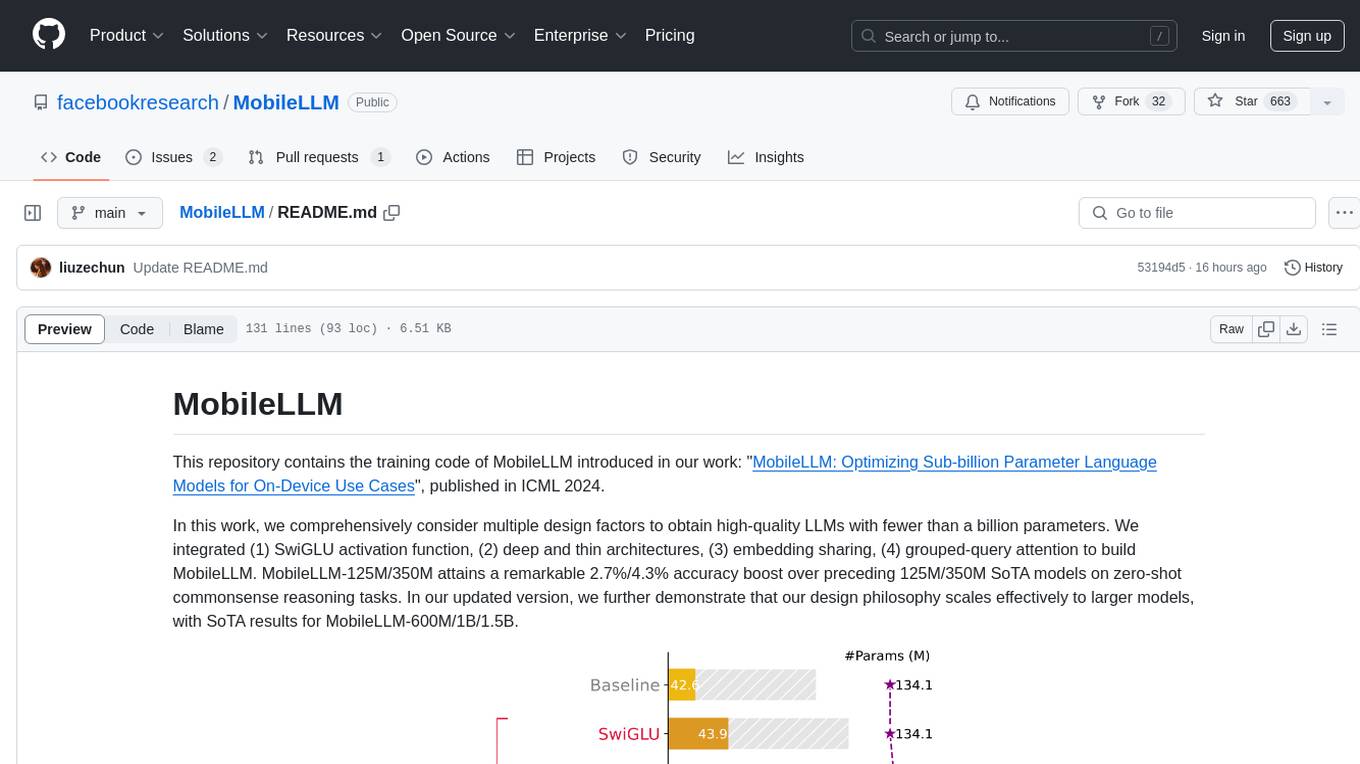
MobileLLM
This repository contains the training code of MobileLLM, a language model optimized for on-device use cases with fewer than a billion parameters. It integrates SwiGLU activation function, deep and thin architectures, embedding sharing, and grouped-query attention to achieve high-quality LLMs. MobileLLM-125M/350M shows significant accuracy improvements over previous models on zero-shot commonsense reasoning tasks. The design philosophy scales effectively to larger models, with state-of-the-art results for MobileLLM-600M/1B/1.5B.
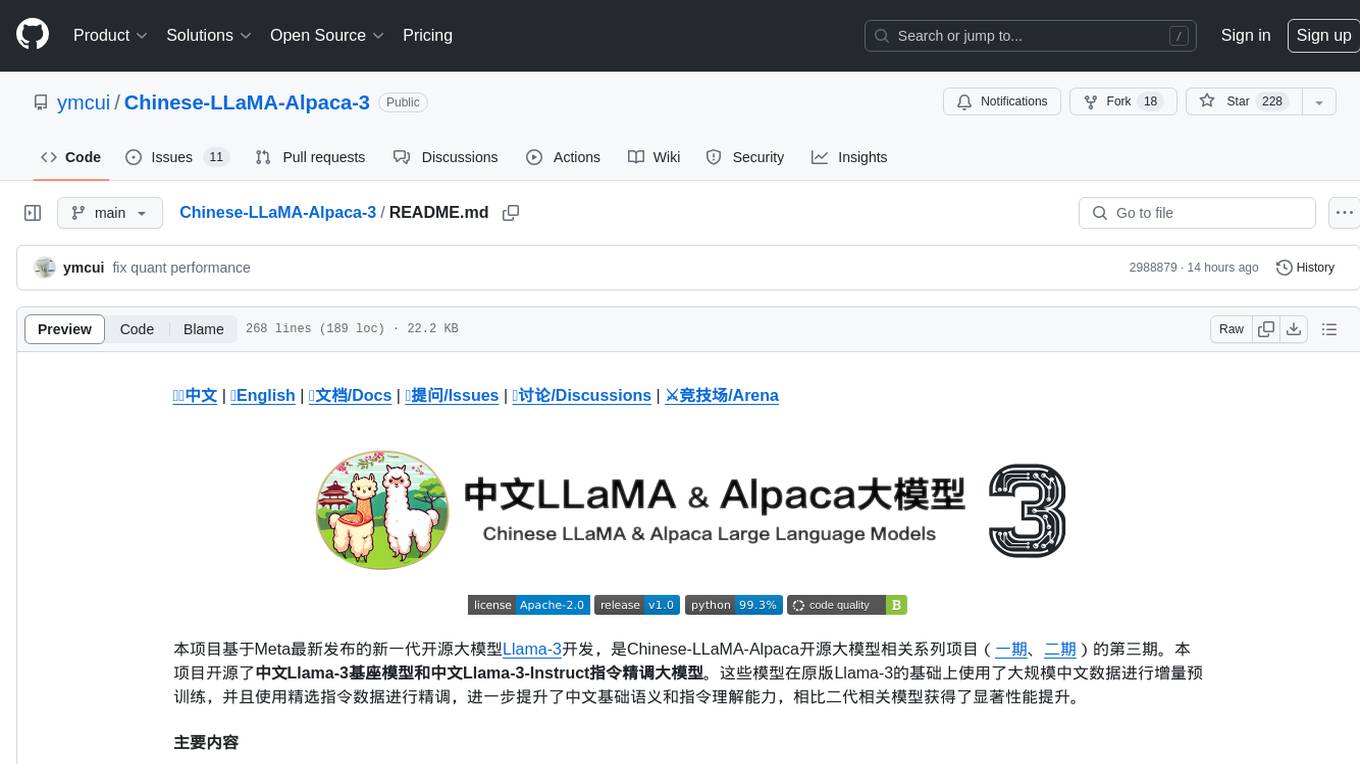
Chinese-LLaMA-Alpaca-3
Chinese-LLaMA-Alpaca-3 is a project based on Meta's latest release of the new generation open-source large model Llama-3. It is the third phase of the Chinese-LLaMA-Alpaca open-source large model series projects (Phase 1, Phase 2). This project open-sources the Chinese Llama-3 base model and the Chinese Llama-3-Instruct instruction fine-tuned large model. These models incrementally pre-train with a large amount of Chinese data on the basis of the original Llama-3 and further fine-tune using selected instruction data, enhancing Chinese basic semantics and instruction understanding capabilities. Compared to the second-generation related models, significant performance improvements have been achieved.
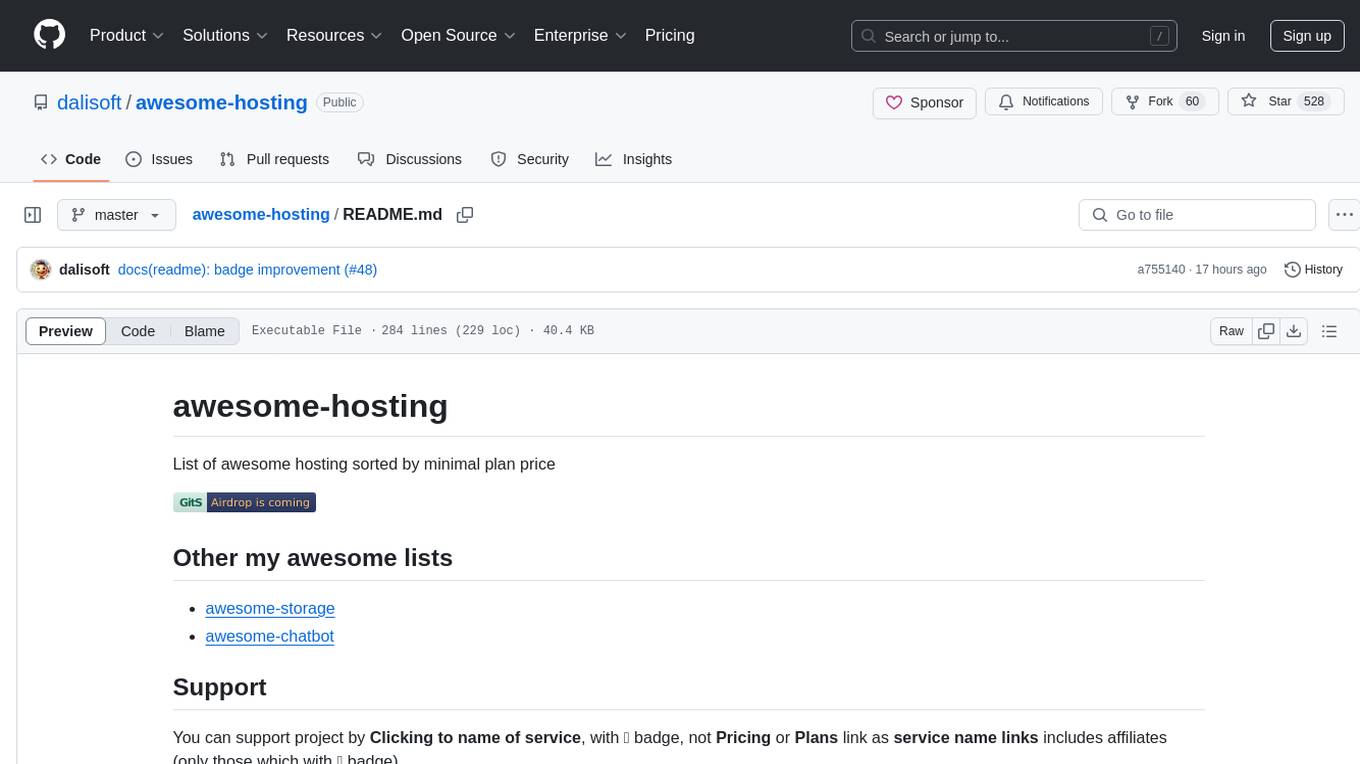
awesome-hosting
awesome-hosting is a curated list of hosting services sorted by minimal plan price. It includes various categories such as Web Services Platform, Backend-as-a-Service, Lambda, Node.js, Static site hosting, WordPress hosting, VPS providers, managed databases, GPU cloud services, and LLM/Inference API providers. Each category lists multiple service providers along with details on their minimal plan, trial options, free tier availability, open-source support, and specific features. The repository aims to help users find suitable hosting solutions based on their budget and requirements.
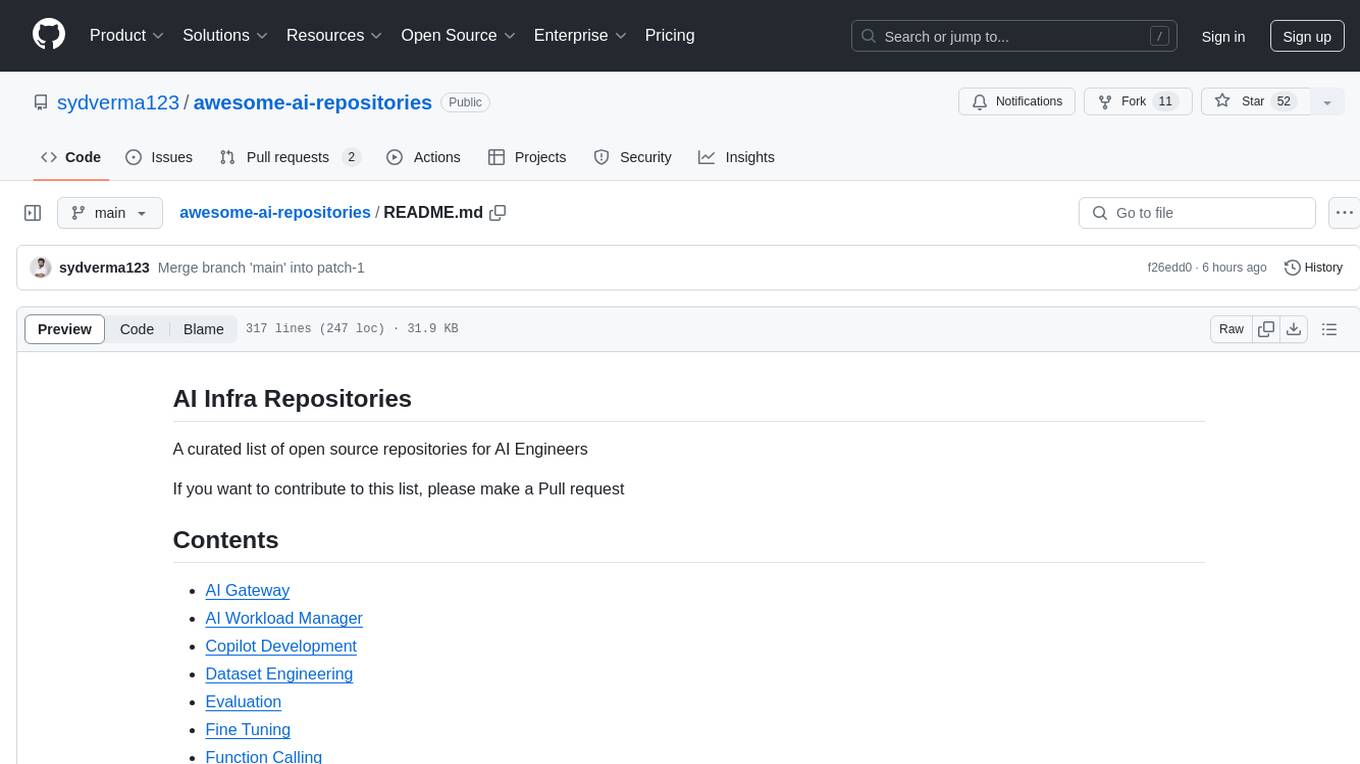
awesome-ai-repositories
A curated list of open source repositories for AI Engineers. The repository provides a comprehensive collection of tools and frameworks for various AI-related tasks such as AI Gateway, AI Workload Manager, Copilot Development, Dataset Engineering, Evaluation, Fine Tuning, Function Calling, Graph RAG, Guardrails, Local Model Inference, LLM Agent Framework, Model Serving, Observability, Pre Training, Prompt Engineering, RAG Framework, Security, Structured Extraction, Structured Generation, Vector DB, and Voice Agent.
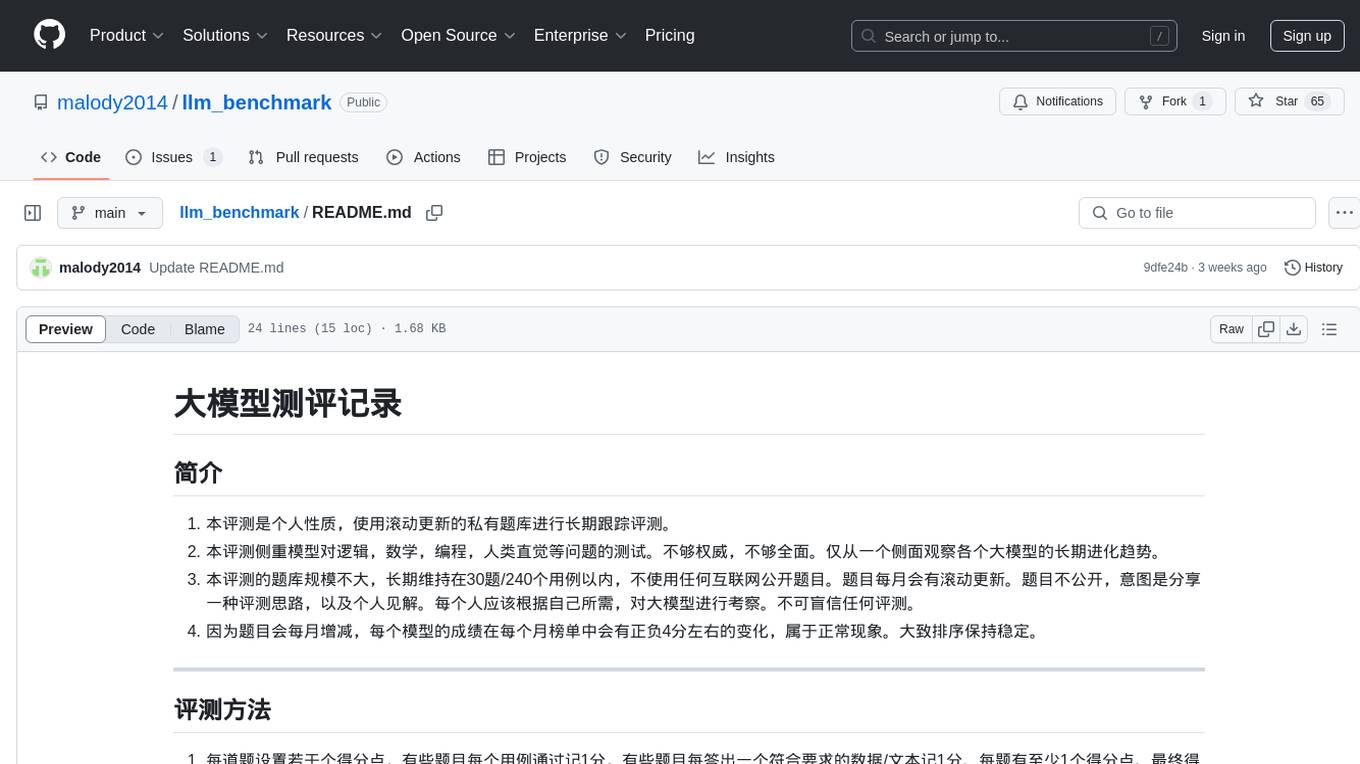
llm_benchmark
The 'llm_benchmark' repository is a personal evaluation project that tracks and tests various large models using a private question bank. It focuses on testing models' logic, mathematics, programming, and human intuition. The evaluation is not authoritative or comprehensive but aims to observe the long-term evolution trends of different large models. The question bank is small, with around 30 questions/240 test cases, and is not publicly available on the internet. The questions are updated monthly to share evaluation methods and personal insights. Users should assess large models based on their own needs and not blindly trust any evaluation. Model scores may vary by around +/-4 points each month due to question changes, but the overall ranking remains stable.
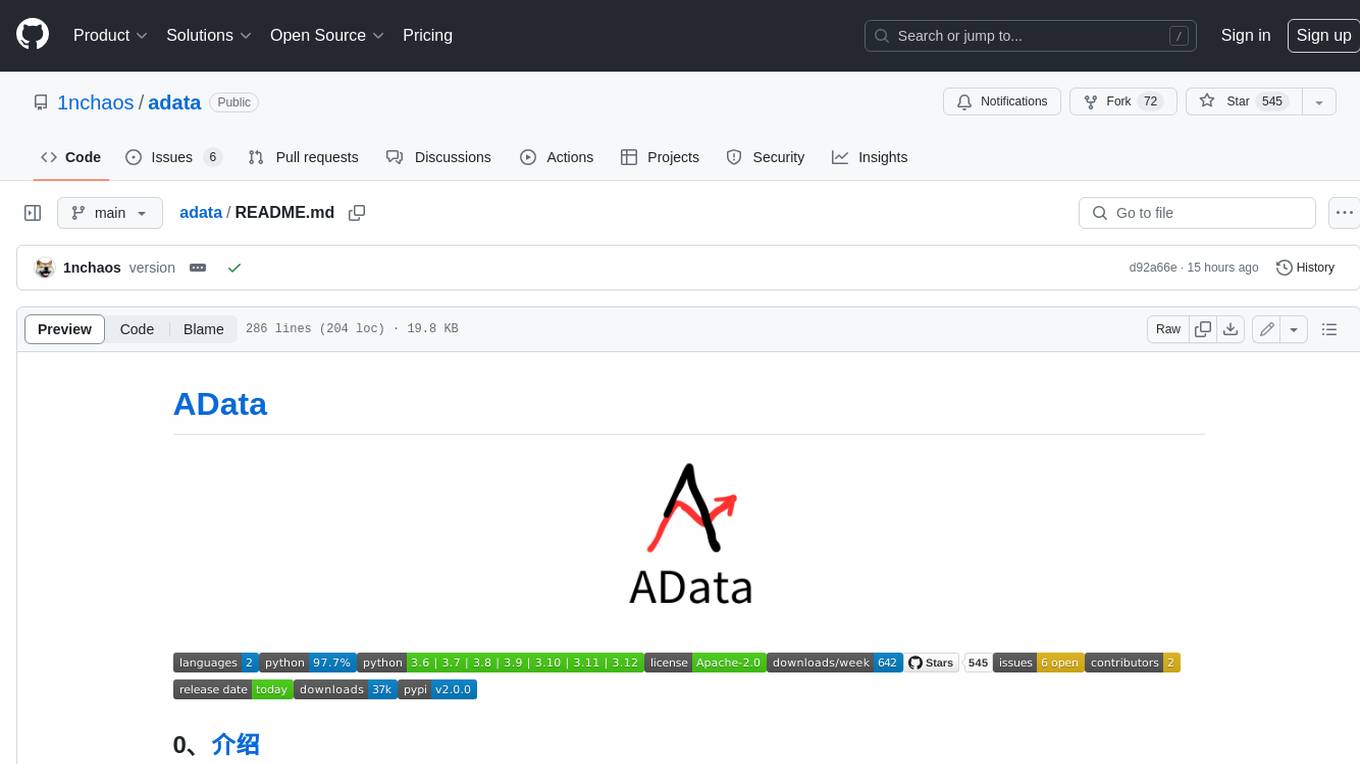
adata
AData is a free and open-source A-share database that focuses on transaction-related data. It provides comprehensive data on stocks, including basic information, market data, and sentiment analysis. AData is designed to be easy to use and integrate with other applications, making it a valuable tool for quantitative trading and AI training.

Chinese-LLaMA-Alpaca-2
Chinese-LLaMA-Alpaca-2 is a large Chinese language model developed by Meta AI. It is based on the Llama-2 model and has been further trained on a large dataset of Chinese text. Chinese-LLaMA-Alpaca-2 can be used for a variety of natural language processing tasks, including text generation, question answering, and machine translation. Here are some of the key features of Chinese-LLaMA-Alpaca-2: * It is the largest Chinese language model ever trained, with 13 billion parameters. * It is trained on a massive dataset of Chinese text, including books, news articles, and social media posts. * It can be used for a variety of natural language processing tasks, including text generation, question answering, and machine translation. * It is open-source and available for anyone to use. Chinese-LLaMA-Alpaca-2 is a powerful tool that can be used to improve the performance of a wide range of natural language processing tasks. It is a valuable resource for researchers and developers working in the field of artificial intelligence.
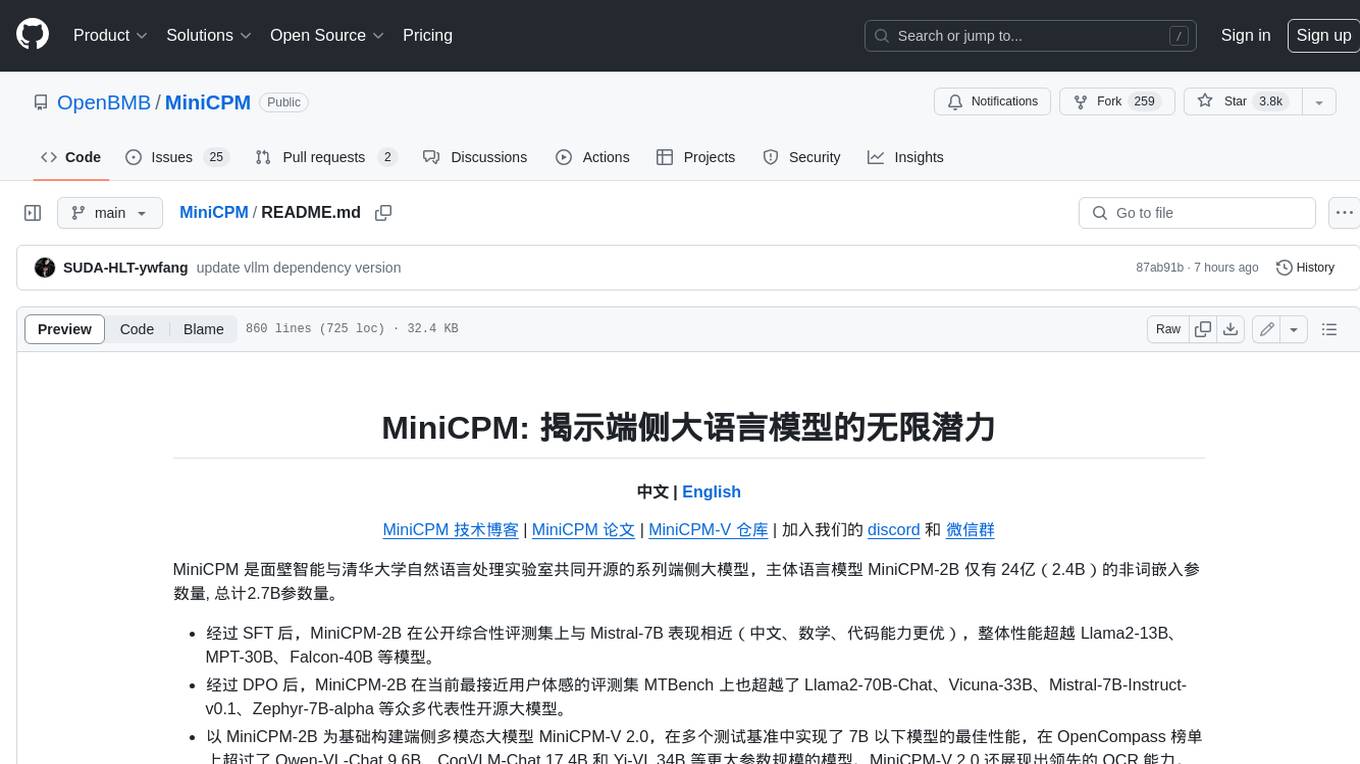
MiniCPM
MiniCPM is a series of open-source large models on the client side jointly developed by Face Intelligence and Tsinghua University Natural Language Processing Laboratory. The main language model MiniCPM-2B has only 2.4 billion (2.4B) non-word embedding parameters, with a total of 2.7B parameters. - After SFT, MiniCPM-2B performs similarly to Mistral-7B on public comprehensive evaluation sets (better in Chinese, mathematics, and code capabilities), and outperforms models such as Llama2-13B, MPT-30B, and Falcon-40B overall. - After DPO, MiniCPM-2B also surpasses many representative open-source large models such as Llama2-70B-Chat, Vicuna-33B, Mistral-7B-Instruct-v0.1, and Zephyr-7B-alpha on the current evaluation set MTBench, which is closest to the user experience. - Based on MiniCPM-2B, a multi-modal large model MiniCPM-V 2.0 on the client side is constructed, which achieves the best performance of models below 7B in multiple test benchmarks, and surpasses larger parameter scale models such as Qwen-VL-Chat 9.6B, CogVLM-Chat 17.4B, and Yi-VL 34B on the OpenCompass leaderboard. MiniCPM-V 2.0 also demonstrates leading OCR capabilities, approaching Gemini Pro in scene text recognition capabilities. - After Int4 quantization, MiniCPM can be deployed and inferred on mobile phones, with a streaming output speed slightly higher than human speech speed. MiniCPM-V also directly runs through the deployment of multi-modal large models on mobile phones. - A single 1080/2080 can efficiently fine-tune parameters, and a single 3090/4090 can fully fine-tune parameters. A single machine can continuously train MiniCPM, and the secondary development cost is relatively low.

carrot
The 'carrot' repository on GitHub provides a list of free and user-friendly ChatGPT mirror sites for easy access. The repository includes sponsored sites offering various GPT models and services. Users can find and share sites, report errors, and access stable and recommended sites for ChatGPT usage. The repository also includes a detailed list of ChatGPT sites, their features, and accessibility options, making it a valuable resource for ChatGPT users seeking free and unlimited GPT services.
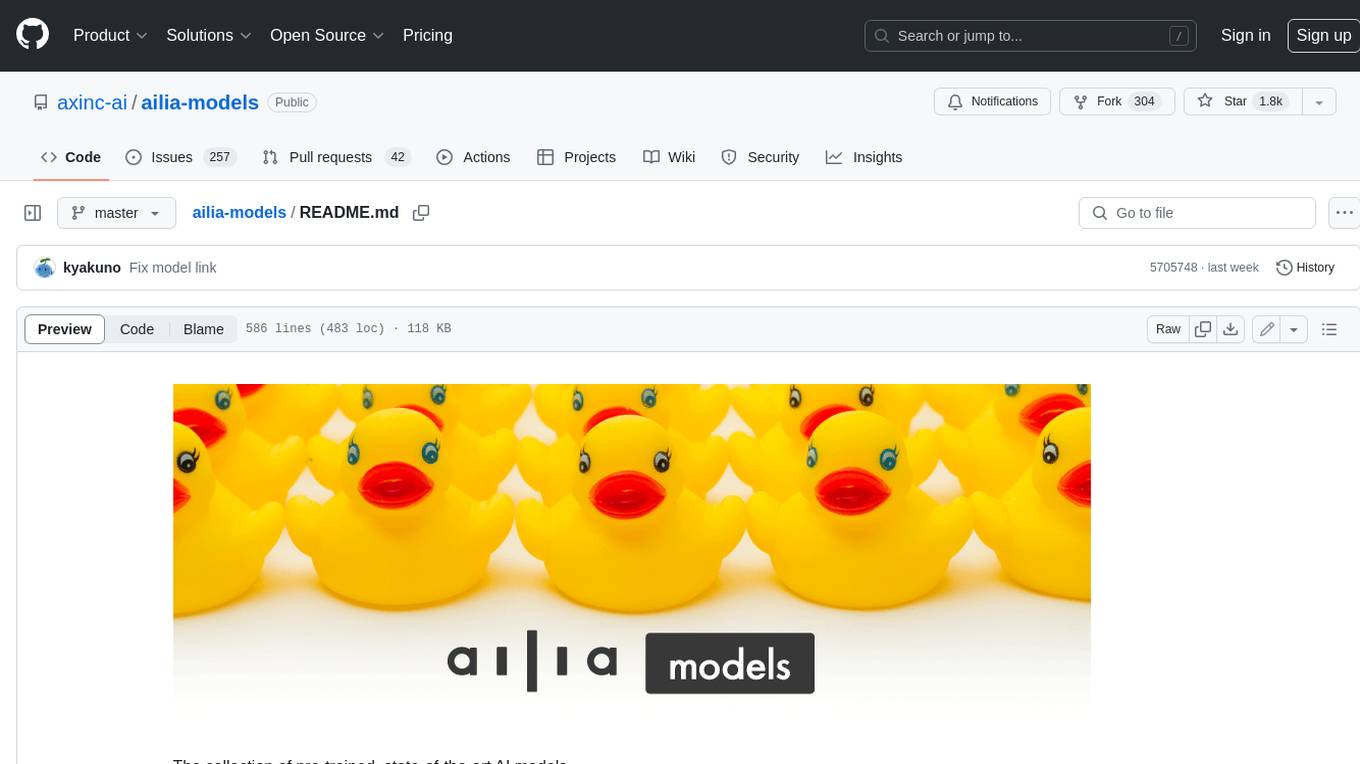
ailia-models
The collection of pre-trained, state-of-the-art AI models. ailia SDK is a self-contained, cross-platform, high-speed inference SDK for AI. The ailia SDK provides a consistent C++ API across Windows, Mac, Linux, iOS, Android, Jetson, and Raspberry Pi platforms. It also supports Unity (C#), Python, Rust, Flutter(Dart) and JNI for efficient AI implementation. The ailia SDK makes extensive use of the GPU through Vulkan and Metal to enable accelerated computing. # Supported models 323 models as of April 8th, 2024
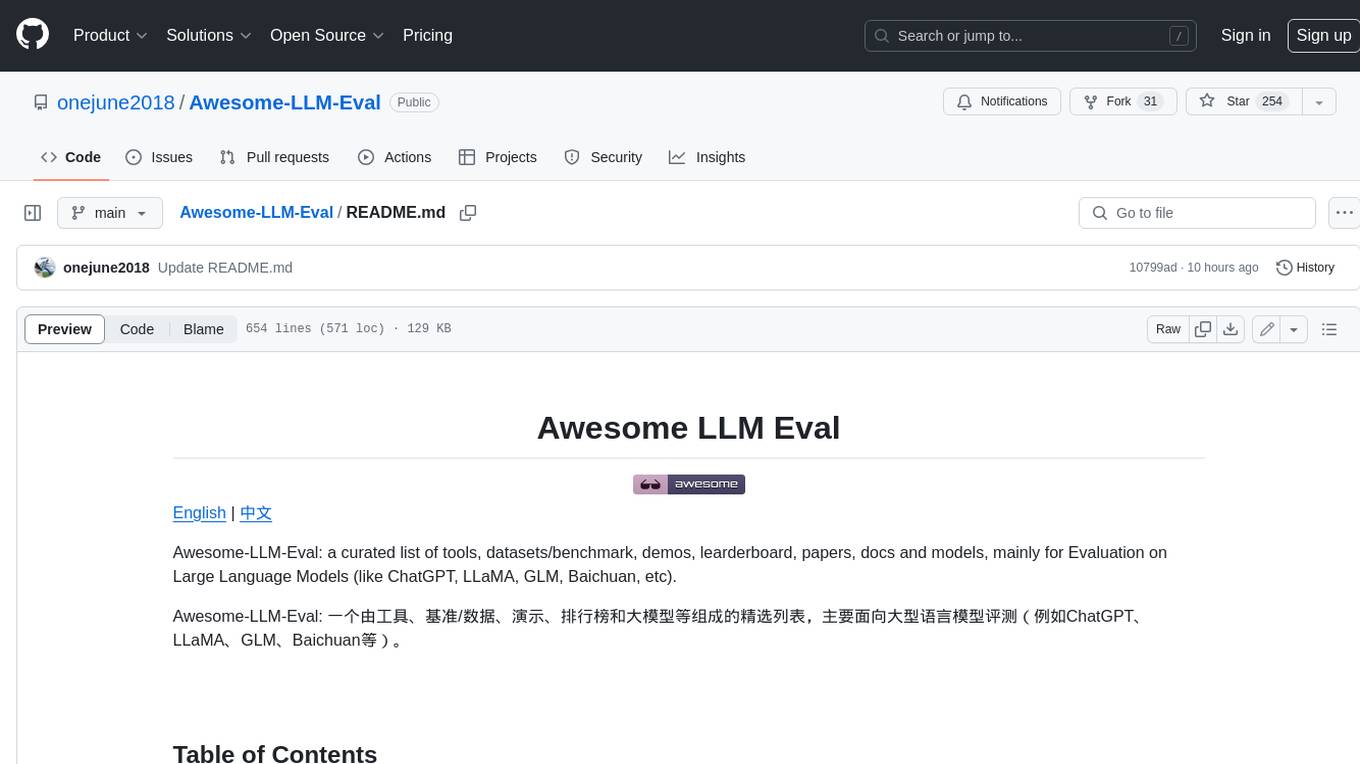
Awesome-LLM-Eval
Awesome-LLM-Eval: a curated list of tools, benchmarks, demos, papers for Large Language Models (like ChatGPT, LLaMA, GLM, Baichuan, etc) Evaluation on Language capabilities, Knowledge, Reasoning, Fairness and Safety.
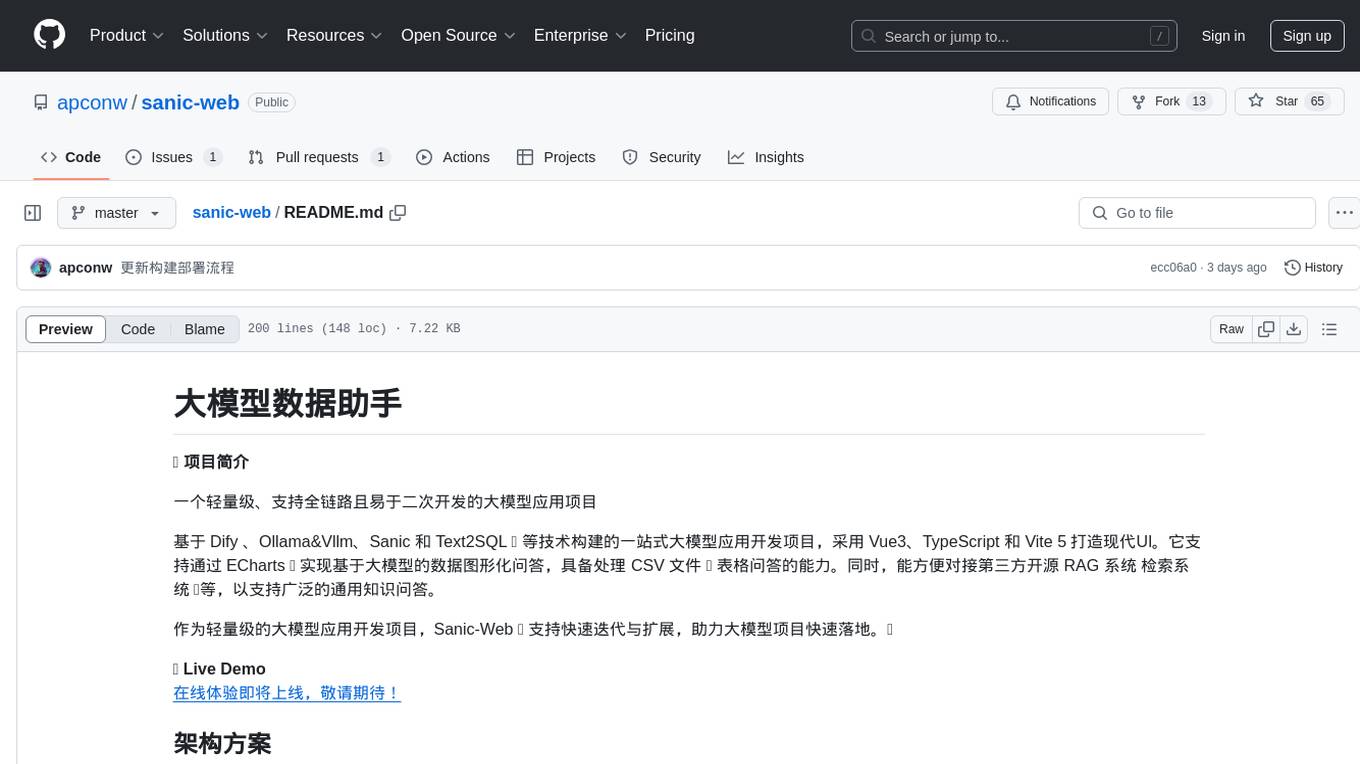
sanic-web
Sanic-Web is a lightweight, end-to-end, and easily customizable large model application project built on technologies such as Dify, Ollama & Vllm, Sanic, and Text2SQL. It provides a one-stop solution for developing large model applications, supporting graphical data-driven Q&A using ECharts, handling table-based Q&A with CSV files, and integrating with third-party RAG systems for general knowledge Q&A. As a lightweight framework, Sanic-Web enables rapid iteration and extension to facilitate the quick implementation of large model projects.
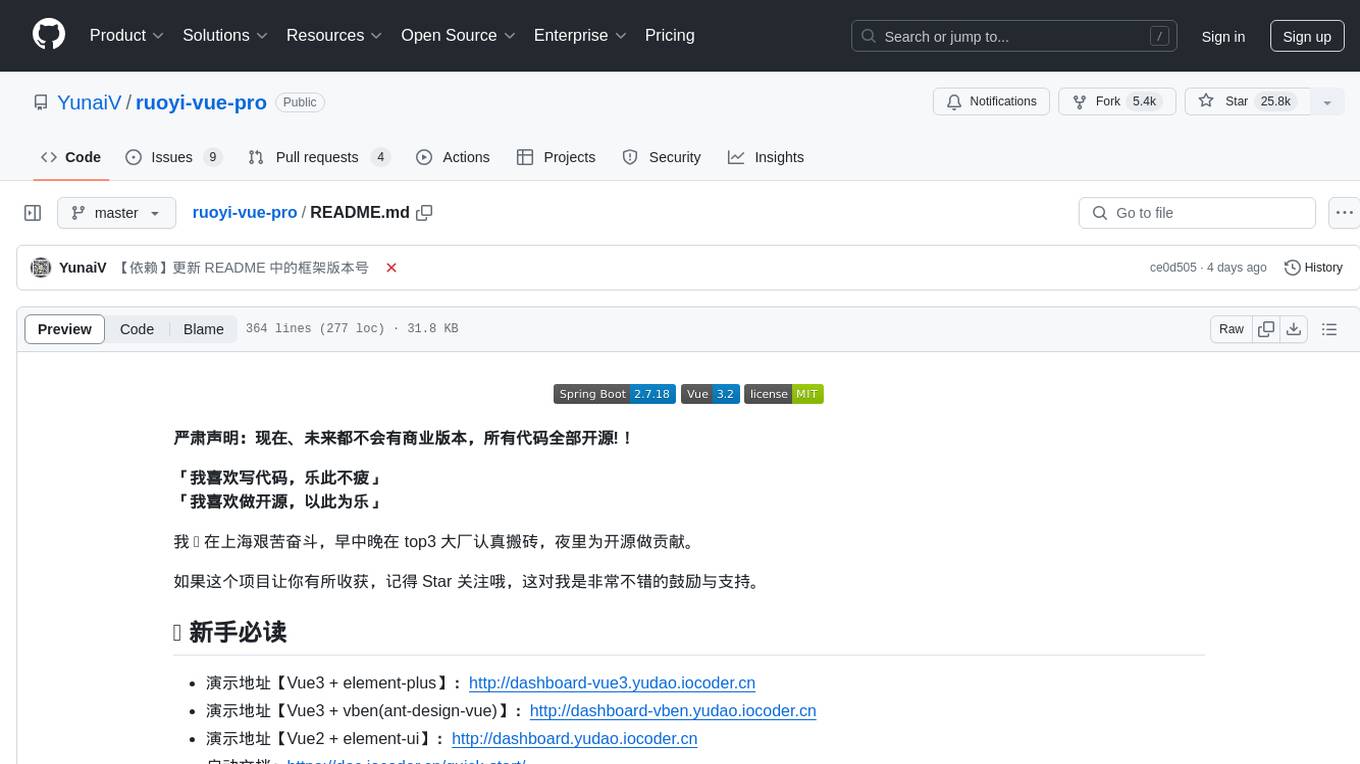
ruoyi-vue-pro
The ruoyi-vue-pro repository is an open-source project that provides a comprehensive development platform with various functionalities such as system features, infrastructure, member center, data reports, workflow, payment system, mall system, ERP system, CRM system, and AI big model. It is built using Java backend with Spring Boot framework and Vue frontend with different versions like Vue3 with element-plus, Vue3 with vben(ant-design-vue), and Vue2 with element-ui. The project aims to offer a fast development platform for developers and enterprises, supporting features like dynamic menu loading, button-level access control, SaaS multi-tenancy, code generator, real-time communication, integration with third-party services like WeChat, Alipay, and cloud services, and more.
For similar tasks

Conference-Acceptance-Rate
The 'Conference-Acceptance-Rate' repository provides acceptance rates for top-tier AI-related conferences in the fields of Natural Language Processing, Computational Linguistics, Computer Vision, Pattern Recognition, Machine Learning, Learning Theory, Artificial Intelligence, Data Mining, Information Retrieval, Speech Processing, and Signal Processing. The data includes acceptance rates for long papers and short papers over several years for each conference, allowing researchers to track trends and make informed decisions about where to submit their work.
For similar jobs
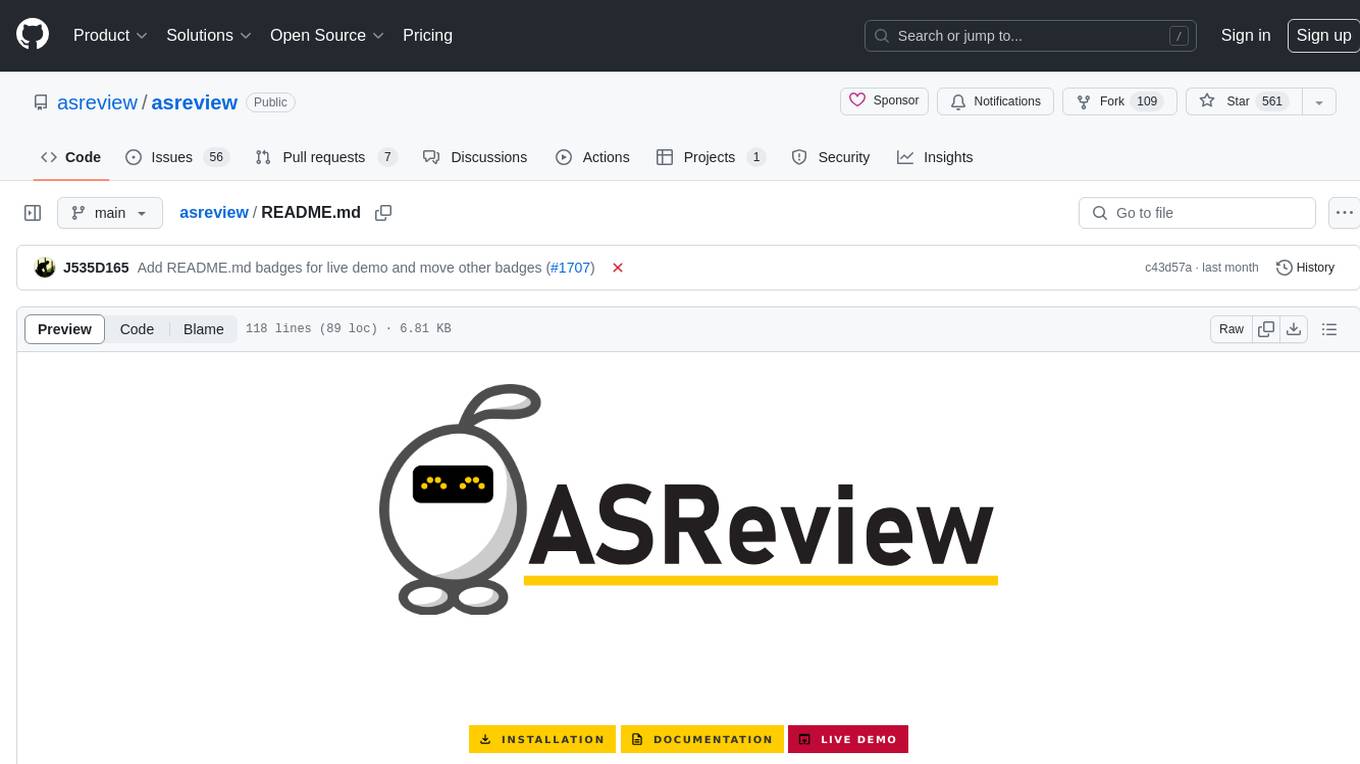
asreview
The ASReview project implements active learning for systematic reviews, utilizing AI-aided pipelines to assist in finding relevant texts for search tasks. It accelerates the screening of textual data with minimal human input, saving time and increasing output quality. The software offers three modes: Oracle for interactive screening, Exploration for teaching purposes, and Simulation for evaluating active learning models. ASReview LAB is designed to support decision-making in any discipline or industry by improving efficiency and transparency in screening large amounts of textual data.
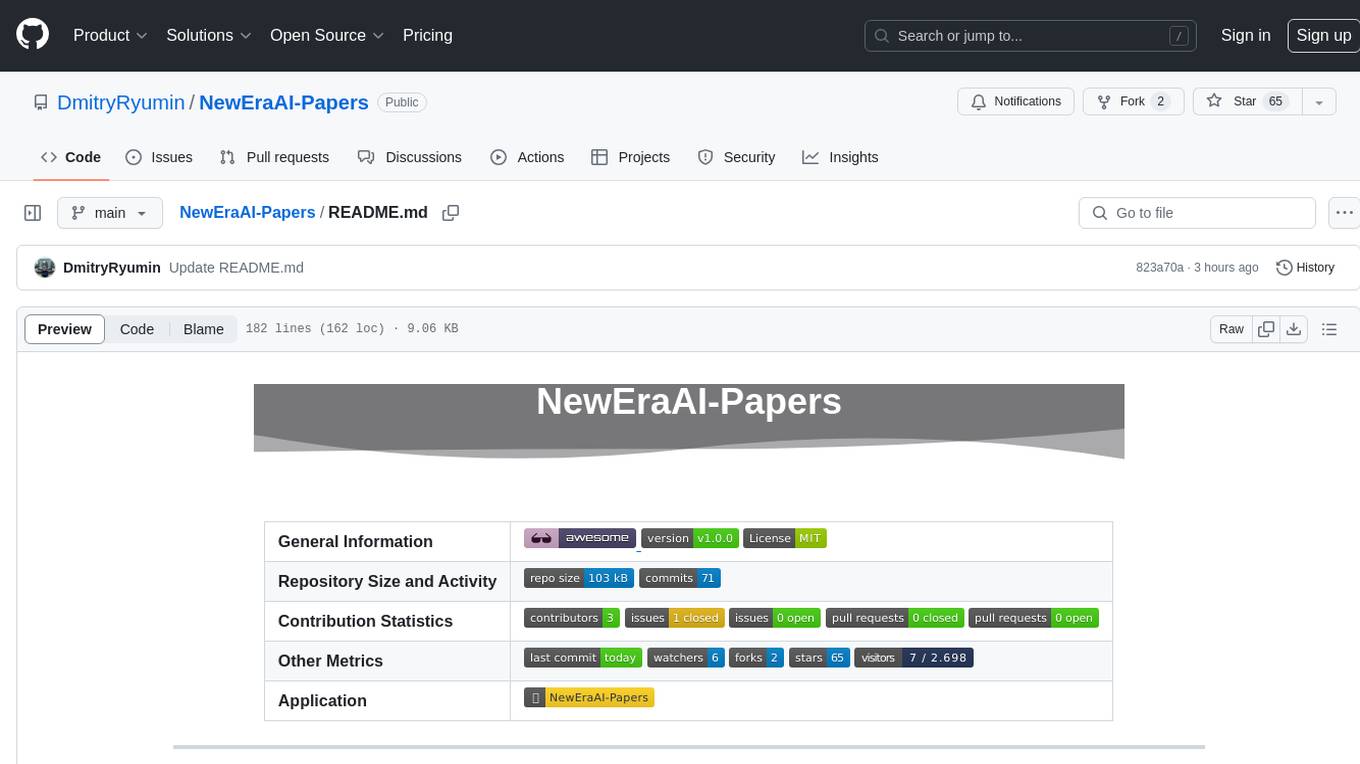
NewEraAI-Papers
The NewEraAI-Papers repository provides links to collections of influential and interesting research papers from top AI conferences, along with open-source code to promote reproducibility and provide detailed implementation insights beyond the scope of the article. Users can stay up to date with the latest advances in AI research by exploring this repository. Contributions to improve the completeness of the list are welcomed, and users can create pull requests, open issues, or contact the repository owner via email to enhance the repository further.
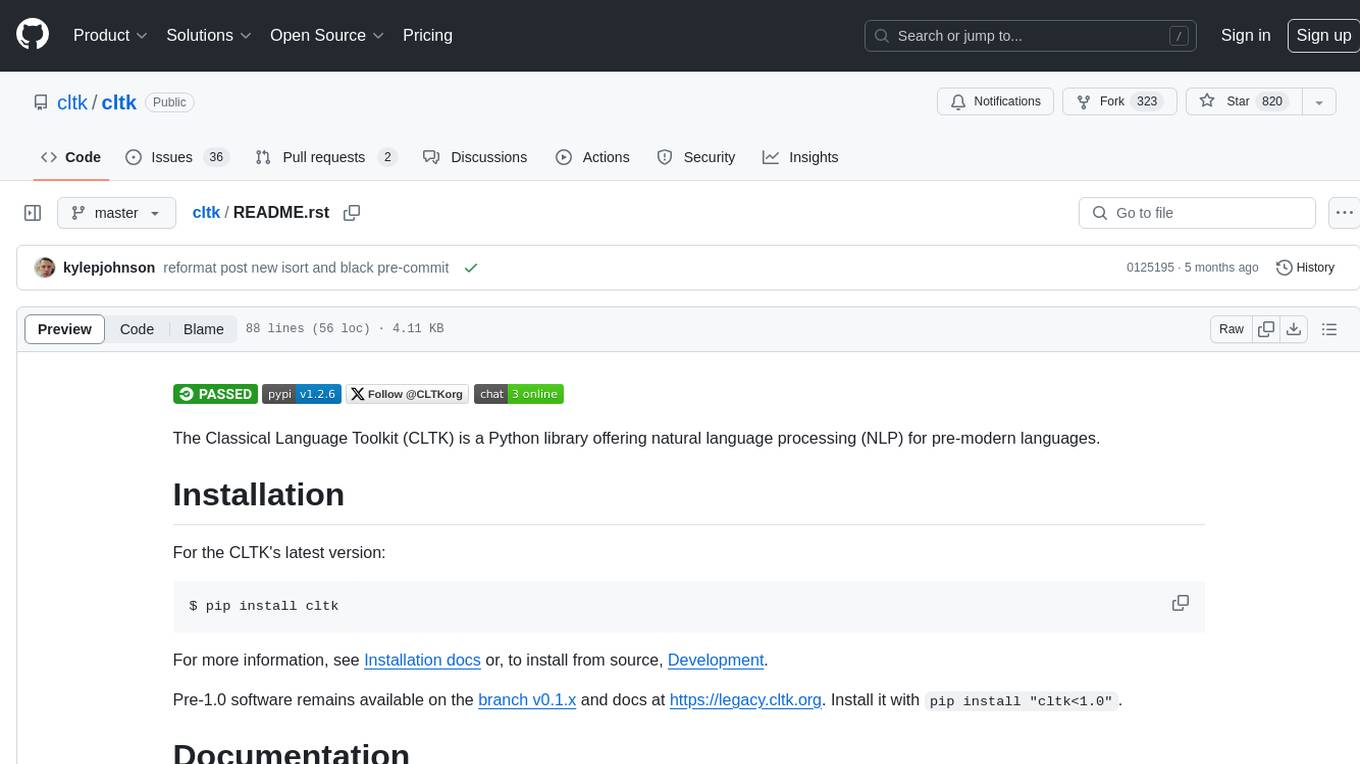
cltk
The Classical Language Toolkit (CLTK) is a Python library that provides natural language processing (NLP) capabilities for pre-modern languages. It offers a modular processing pipeline with pre-configured defaults and supports almost 20 languages. Users can install the latest version using pip and access detailed documentation on the official website. The toolkit is designed to meet the unique needs of researchers working with historical languages, filling a void in the NLP landscape that often neglects non-spoken languages and different research goals.

Conference-Acceptance-Rate
The 'Conference-Acceptance-Rate' repository provides acceptance rates for top-tier AI-related conferences in the fields of Natural Language Processing, Computational Linguistics, Computer Vision, Pattern Recognition, Machine Learning, Learning Theory, Artificial Intelligence, Data Mining, Information Retrieval, Speech Processing, and Signal Processing. The data includes acceptance rates for long papers and short papers over several years for each conference, allowing researchers to track trends and make informed decisions about where to submit their work.
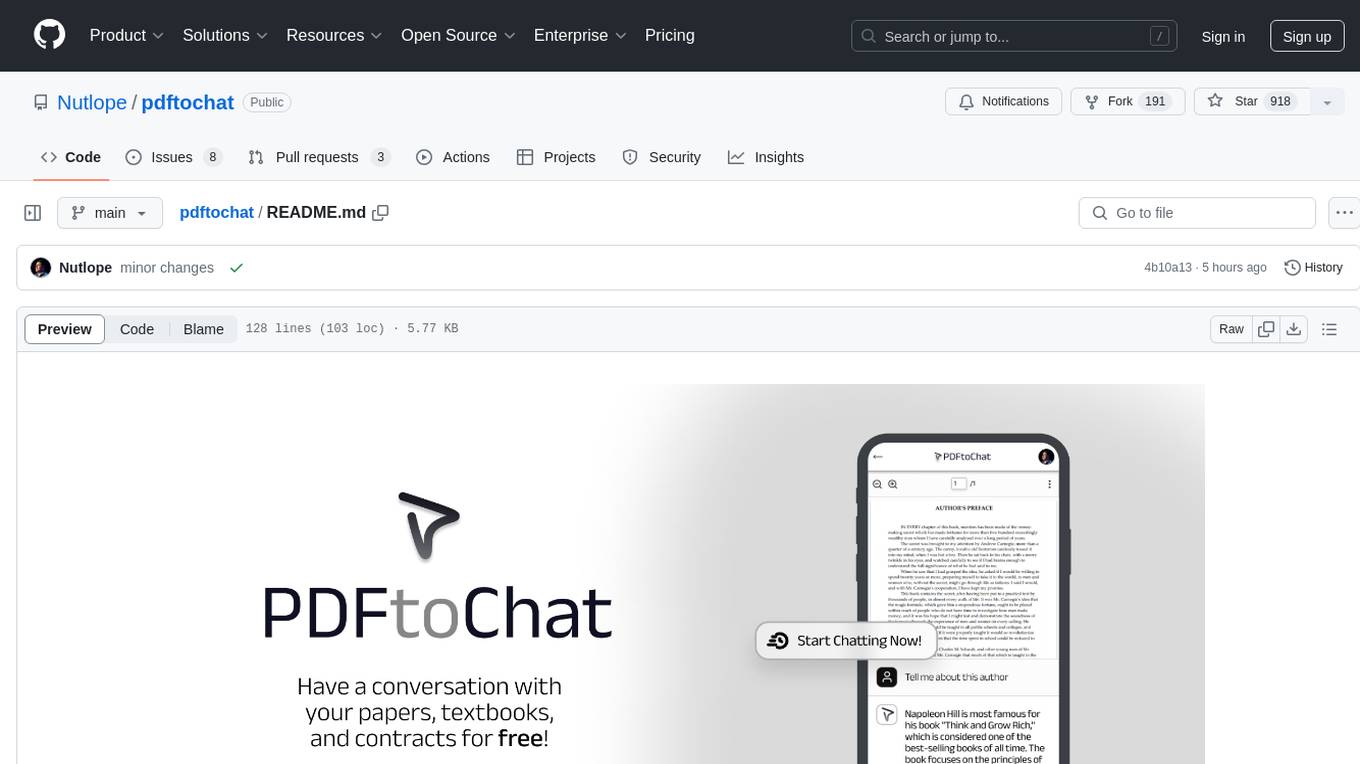
pdftochat
PDFToChat is a tool that allows users to chat with their PDF documents in seconds. It is powered by Together AI and Pinecone, utilizing a tech stack including Next.js, Mixtral, M2 Bert, LangChain.js, MongoDB Atlas, Bytescale, Vercel, Clerk, and Tailwind CSS. Users can deploy the tool to Vercel or any other host by setting up Together.ai, MongoDB Atlas database, Bytescale, Clerk, and Vercel. The tool enables users to interact with PDFs through chat, with future tasks including adding features like trash icon for deleting PDFs, exploring different embedding models, implementing auto scrolling, improving replies, benchmarking accuracy, researching chunking and retrieval best practices, adding demo video, upgrading to Next.js 14, adding analytics, customizing tailwind prose, saving chats in postgres DB, compressing large PDFs, implementing custom uploader, session tracking, error handling, and support for images in PDFs.
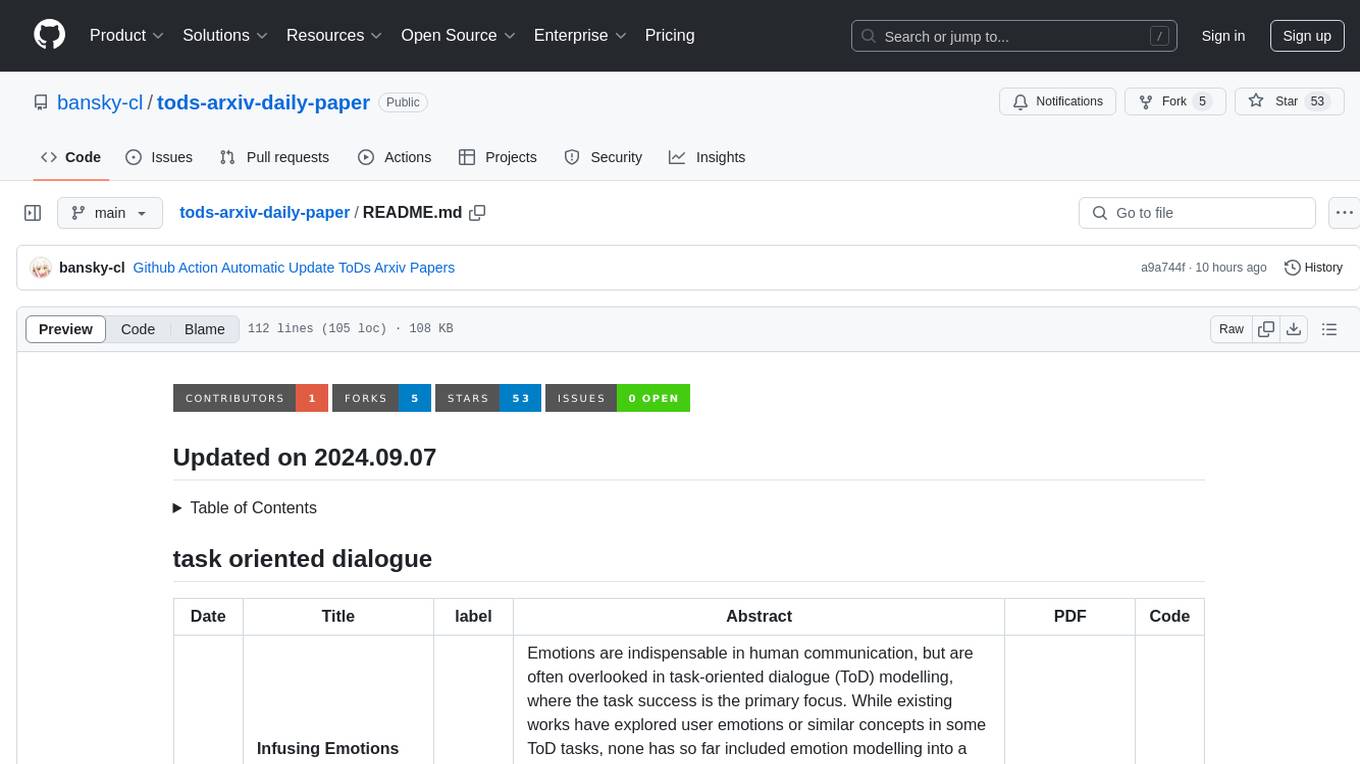
tods-arxiv-daily-paper
This repository provides a tool for fetching and summarizing daily papers from the arXiv repository. It allows users to stay updated with the latest research in various fields by automatically retrieving and summarizing papers on a daily basis. The tool simplifies the process of accessing and digesting academic papers, making it easier for researchers and enthusiasts to keep track of new developments in their areas of interest.
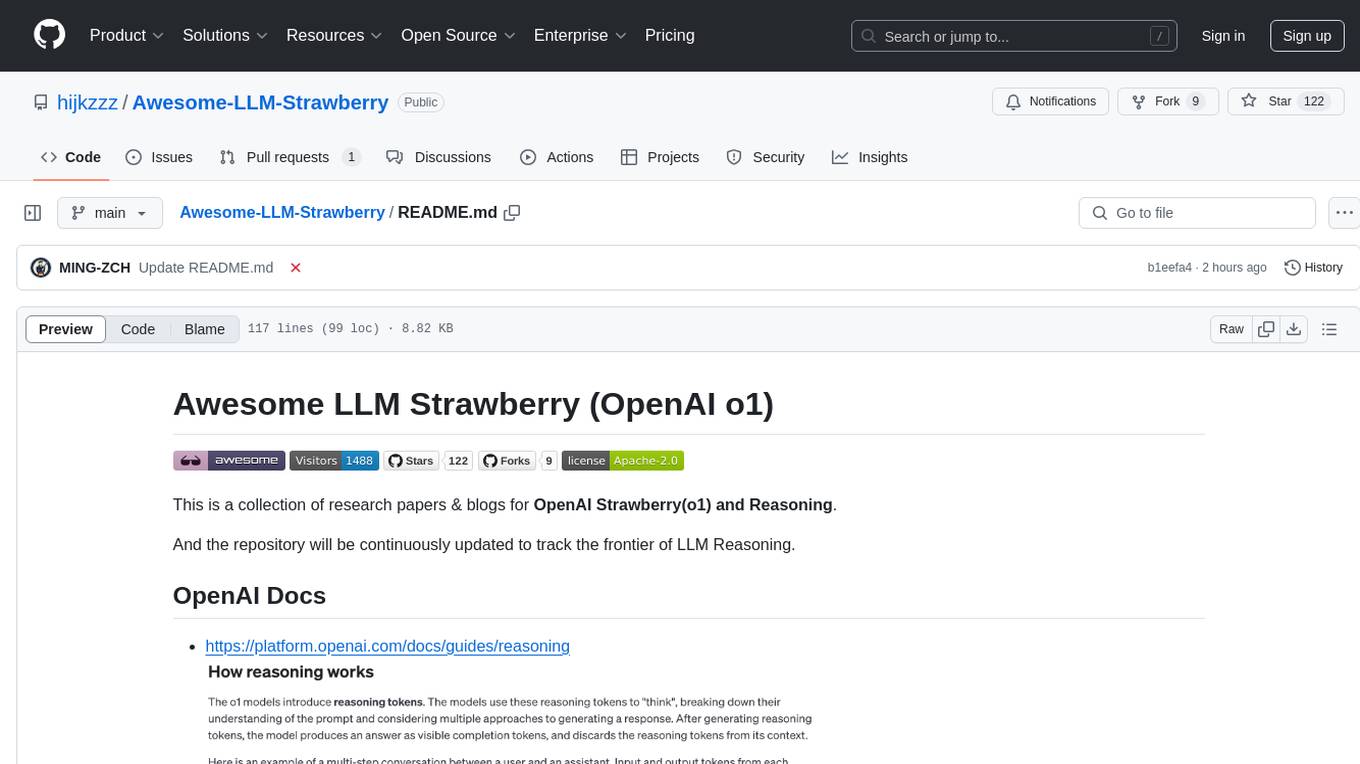
Awesome-LLM-Strawberry
Awesome LLM Strawberry is a collection of research papers and blogs related to OpenAI Strawberry(o1) and Reasoning. The repository is continuously updated to track the frontier of LLM Reasoning.
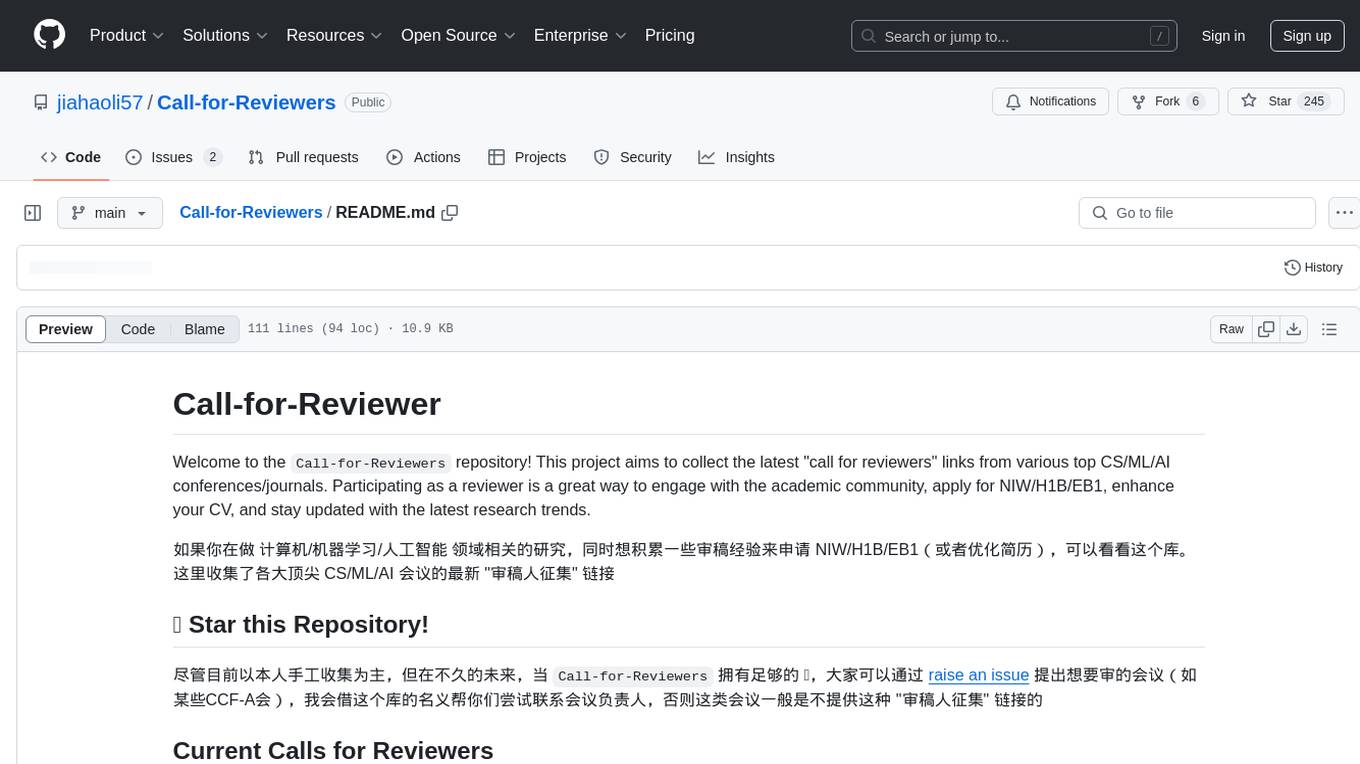
Call-for-Reviewers
The `Call-for-Reviewers` repository aims to collect the latest 'call for reviewers' links from various top CS/ML/AI conferences/journals. It provides an opportunity for individuals in the computer/ machine learning/ artificial intelligence fields to gain review experience for applying for NIW/H1B/EB1 or enhancing their CV. The repository helps users stay updated with the latest research trends and engage with the academic community.

